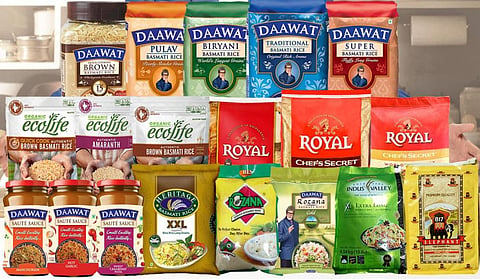

You may be forgiven for wondering what is the relationship between the attacks by Yemen’s Houthi rebels on ships in the Red Sea and Daawat Basmati rice, arguably the most recognizable Indian food brand globally.
These attacks however, are a cause of concern the management at LT Foods, which generates most of its Rs 8,000 crore annual revenue fromthe sales of Daawat and Royal rice.
Like many of India's export-driven companies, LT Foods is being forced to consider increasing its prices in its key overseas markets. It is also focusing more on its India business, which is now growing faster than its international business.
Middle East Politics and Daawat Rice
The troubles started on Oct 19, when Houthi militants from Yemen started attacking ships navigating through the Red Sea towards the Suez Canal, thus disrupting one lf the key arteries of the global shipping industry. The United Nations Conference on Trade and Development (UNCTAD) reported a drastic 45% drop in freight traffic through the Suez Canal in the two months following these attacks.
Due to the attacks, shipping companies are rerouting their vessels to avoid the Red Sea, opting for the longer journey around the Cape of Good Hope, significantly increasing shipping times and costs. This is estimated to have led to a two-thirds decline in weekly container ship transits through the Suez Canal.
This has come as bad news for LT Foods, which has traditionally depended on the US and Europe to generate a large chunk of its profits.
While the US West Coast could be supplied through the Pacific Ocean route, the company depends on the Suez route for supplying the East Coast and Europe - both of which are key markets. So far, however, there has not been too much of a disruption thanks to ample reserve stocks.
"Our healthy inventory meant there was no loss of sales due to this disruption,” said Ashwani Arora, Managing Director and CEO, LT Foods. However, he added that shipping companies are imposing surcharges. This is due to higher insurance premiums and, in some cases, rerouting of ships around the African continent.
The company estimates that surcharges are costing it around Rs 4 crores per month.
If the situation doesn't turn around quickly, said Arora, LT Foods would be forced to raise prices in the affected markets. At the same time, he said, the company would try to push back such a price hike as long as possible.
“Being a consumer brand, pricing changes require prudence and cannot be knee-jerk. We are currently assessing whether this impact is long term before taking any call,” he said.
Strong Quarter
Meanwhile, the company reported strong growth in its third quarter results. Its consolidated net profit rose by around 50% year-on-year to Rs 153 crores, driven by expansion in flagship brands like Royal and Daawat.
The company said its key brands saw double-digit percentage growth in both quantity of merchandise sold and the revenue generated despite the disruptions. In its India branded Basmati business, the company saw 15% volume growth and 20% revenue growth.
LT Foods is figuring out ways to make its supply chain infrastructure more resilient, Arora said.
Product Diversification
The company, which gets the overwhelming share of its revenue from the sale of rice, is planning to diversify its business in coming years.
It will focus on two emerging businesses – organic products and value added products.
"We have rebuilt a more robust and stable portfolio focusing on quality offerings and strategic clients vs only commodity products earlier.” He further said. “Growth will be back on track for organic business next fiscal onwards as we start lapping the base,” he added.
The company’s value added ready-to-heat and ready-to-cook segment has shown promising traction growing at 23% in recent times.
Its value-added products are also sold under the flagship Daawat brand. Some of the examples are Biryani Kits, Snack Packs and Cuppa Rice. Investments are being made in product innovation and capacity augmentation to feed into this consumer trend, Arora said.
Moreover, said Arora, the India branded Basmati business is also doing well, with a 20% jump in revenue during the last quarter. Much of the growth is being driven by rising incomes with the Indian middle class, Arora pointed out.
“We outpaced company average growth..as Basmati consumption rises with income levels,” he said.
Because of this, India could contribute higher to the revenue mix going forward given its 12-15% annual growth rates which exceeds those of other geographies, he said.
To leverage the rising demand, the company would invest in its branded rice business in India through celebrity endorsements, more advertising and better distribution network.